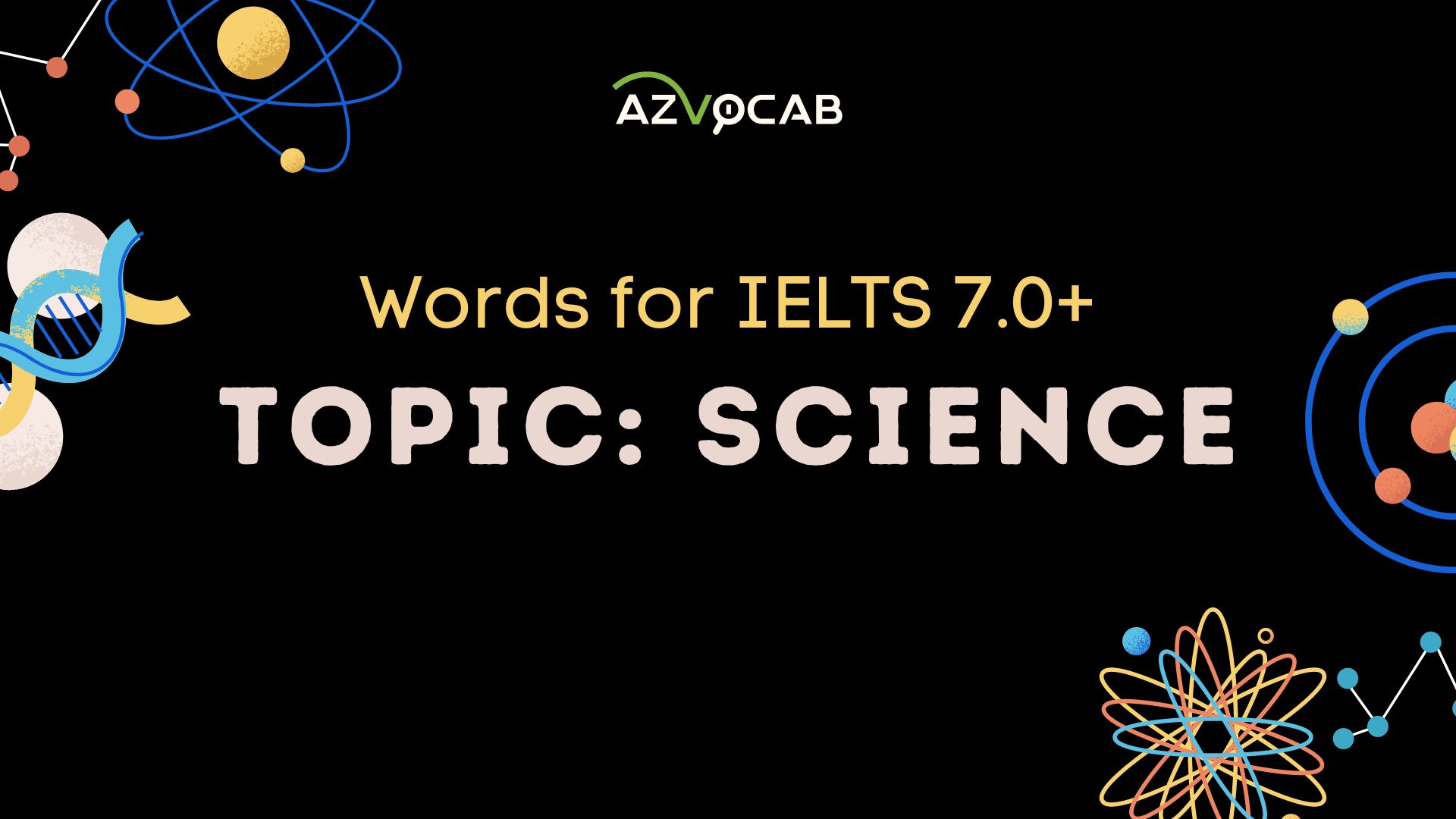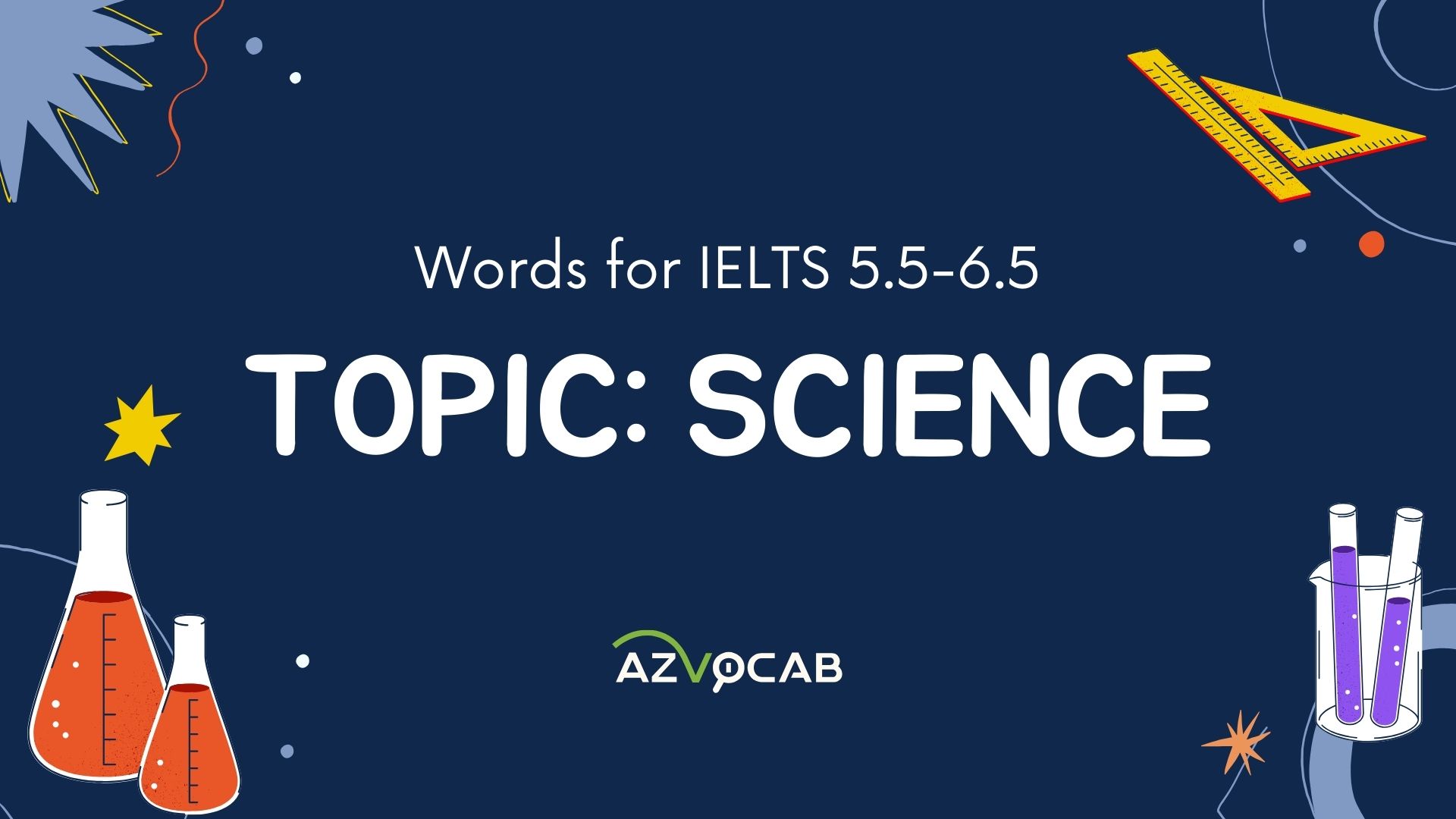200+ Common Words of Topic People and Relationships for the IELTS exam
30 August, 2023Common words for IELTS

azVocab has compiled over 200 common words on the topic of “People and Relationship” for the IELTS exam. These vocabulary words can be used in all four sections of four skills: Reading, Listening, Speaking, and Writing. azVocab has carefully selected examples that fit specific contexts in IELTS exams. This will help you understand how to use these words in context, increasing the effectiveness of your vocabulary learning.
1. Vocabulary about human development
| Từ + nghĩa | Ví dụ |
| adolescence (n.) – the period of time in a person’s life when they are developing into an adult | Between the ages of six and twelve, a child reaches what is termed ‘middle childhood’ and they will stay in this phase until they reach adolescence. |
| adolescent (n.) – a young person who is developing into an adult | In terms of their cognitive development, adolescents have greater reasoning skills and have developed the ability to think logically and hypothetically. |
| adulthood (n.) – the part of someone’s life when they are an adult | In adulthood, hedgehogs meet primarily to mate, producing litters of four or five hoglets as often as twice yearly. |
| childhood (n.) – the time when someone is a child | Studies have shown that stress in adulthood can be related to an unhappy childhood. |
| growth (n.) – the growth of a person, animal, or plant is its process of increasing in size | As far as physical milestones are concerned, during middle childhood, growth is steady but less rapid than during the pre-school years. |
| height (n.) – the distance from the top to the bottom of something, or the quality of being tall | Within a year, boys and girls can gain an average of 4.1 inches and 3.5 inches in height respectively. |
| infancy (n.) – the time when someone is a baby or a very young child | This is also a period of enormous physical change and adolescents experience changes in their physical development at a rate unparalleled since infancy. |
| infant (n.) – a baby or a very young child | There was a significant increase in brain size from about 400,000 years ago, and this may correlate with increasing infant dependence. |
| maturity (n.) – a very advanced or developed form or state | Eyes will reach maturity in both size and function. |
| milestone (n.) – an important event in the development or history of something or in someone’s life | In the first years of a child’s life, many important milestones are reached. |
| period (n.) – a length of time | The other participants had to periodically shift priorities, improving their skills in one area for a period of time while also maximising their success at the other tasks. |
| phase (n.) – any stage in a series of events or in a process of development | This growth spurt typically occurs two years earlier for girls than for boys and can tend to make both sexes go through a clumsy phase. |
| rate (n.) – the speed at which something happens or changes, or the amount or number of times it happens or changes in a particular period | Stress causes the body to burn up calories at a faster than normal rate. |
| stage (n.) – a part of an activity or a period of development | There are some major changes occurring at this stage as baby teeth will come out and permanent adult teeth wilt grow. |
| teenager (n.) – a young person between 13 and 19 years old | Adolescence is a period of transition for teenagers and there are many crucial milestones. |
| toddler (n.) – a young child, especially one who is learning or has recently learned to walk | By the age of two or three. the infant has reached the toddler stage. |
| transition (n.) – a change from one form or type to another, or the process by which this happens | The final stage before adulthood is adolescence. This is a period of transition for teenagers and there are many crucial milestones. |
| welfare (n.) – physical and mental health and happiness, especially of a person | The government has had to cut expenditures in most areas in order to fund the cost of borrowing and welfare. |
| fully-grown (adj.) – people and other living things that are full-grown have finished their physical growth and will not grow taller | The average height is rather below four feet, although many full-grown adults may be found who are very much smaller than this. |
| immature (adj.) – not yet completely grown or developed | Children in middle childhood seem very immature in terms of their emotional and social skills. |
| mature (adj.) – mature people behave like adults in a way that shows they are well developed emotionally | My younger brother is very mature for his age. He doesn’t need my parents to help him with everything. |
| develop (v.) – to (cause something to) grow or change into a more advanced, larger, or stronger form | From birth, parents can nurture and help develop these social competencies by making eye contact with their babies, offering toys and playing with them. |
| endure (v.) – to suffer something difficult, unpleasant, or painful | Children who experience a rewarding friendship before the birth of o sibling are likely to have a better relationship with that brother or sister that endures throughout their childhood. |
| establish (v.) – to start having a relationship with, or communicating with another person, company, country, or organization | I have established a close connection with an older member of my family. |
| nurture (v.) – to take care of, feed, and protect someone or something, especially young children or plants, and help him, her, or it to develop | If we don’t nurture the artistic skills of young children, they are far less creative as adults. |
2. Vocabulary about characteristics and personality
| Từ + Nghĩa | Ví dụ |
| ability (n.) – the physical or mental power or skill needed to do something | A ‘cognitively fluid’ mentality is an ability to link together information from different areas of our life. |
| behaviour (n.) – the way that someone behaves | We can potentially track language by looking at the behaviour of other animals. |
| character (n.) – the particular combination of qualities in a person or place that makes them different from others | Within a tenth of a second of seeing an unfamiliar face, we have already made a judgement about its owner’s character – caring, trustworthy, aggressive, extrovert, competent and so on. |
| characteristic (n.) – a typical or noticeable quality of someone or something | These yards sprang up either in or around many major cities in the nineteenth century but were particularly characteristic of London. |
| courage (n.) – the ability to control your fear in a dangerous or difficult situation | Courage is not motivated by fearlessness, but by moral obligation. |
| instinct (n.) – the way people or animals naturally react or behave, without having to think or learn about it | I don’t think just anyone can be a good parent. Not everyone has the right instincts. |
| memory (n.) – the ability to remember information, experiences, and people | Our memory prefers creating the past from the perspective of how relevant it is to our present situation. |
| mind (n.) – the part of a person that makes it possible for him or her to think, feel emotions, and understand things | Our bodies and minds not only adapt to the surrounding world, but we actively shape and construct our environment to better suit our needs. |
| nature (n.) – the type or main characteristic of something | If you think that these transport problems can be solved by building more roads, you completely misunderstand the nature of the problem. |
| optimist (n.) – someone who always believes that good things will happen | Pete, ever the optimist, said things were bound to improve. |
| originality (n.) – the quality of being special and interesting and not the same as anything or anyone else | I don’t like his style, but you have to admire the originality of his work. |
| pessimist (n.) – a person who thinks that bad things are more likely to happen or who emphasizes the bad part of a situation | Pessimists point out that every attempt to change the council’s composition has failed. |
| resemblance (n.) – the fact that two people or things look like each other or are similar in some other way | Everyone tells me that the physical resemblance between me and my maternal grandmother is very striking. |
| temperament (n.) – the part of your character that affects your moods and the way you behave | I think have my father’s temperament – we’re both very stubborn! |
| trait (n.) – a particular characteristic that can produce a particular type of behaviour | Telling stories is a trait which is common to all nations. |
| abstract (adj.) – existing as an idea, feeling, or quality, not as a material object | Cognitive fluidity makes it possible for human beings to emerge from the concrete situational present and to adopt a more general and abstract approach. |
| apprehensive (adj.) – feeling worried about something that you are going to do or that is going to happen | We did not interview females, as they were not vocal and quite apprehensive of appearing before strangers. |
| assertive (adj.) – someone who is assertive behaves confidently and is not frightened to say what they want or believe | If you really want the promotion, you’ll have to be more assertive. |
| clumsy (adj.) – a clumsy person often has accidents because they do not behave in a careful, controlled way | I’m always dropping things so some people think I’m a little bit too clumsy. |
| cognitive (adj.) – connected with thinking or conscious mental processes | When it comes to cognitive development, he will be able to find hidden objects easily and use objects correctly such as drinking from a cup. |
| consistent (adj.) – always behaving or happening in a similar, especially positive, way | Our results are consistent with some winners using their prize to take additional risks or buy luxury goods. |
| cooperative (adj.) – willing to help or do what people ask | The president said the visit would develop friendly and cooperative relations between the two countries. |
| cynical (adj.) – believing that people are only interested in themselves and are not sincere | Many people have become cynical about the stage-managed debates between politicians which regularly appear on television. |
| desirable (adj.) – worth having and wanted by most people | Young people may not see popularity as a desirable trait. |
| eccentric (adj.) – strange or unusual, sometimes in a humorous way | Such originality as there consists of a variety of eccentric themes. |
| egotistical (adj.) – thinking that you are better or more important than anyone else | He is portrayed as a handsome young man, but has a rather cocky and egotistical personality. |
| fond (adj.) – happy and loving | I am fond of watching films at home, but I have to say that I prefer films in the cinema. |
| gullible (adj.) – easily deceived or tricked, and too willing to believe everything that other people say | There is any number of miracle cures on the market for people gullible enough to buy them. |
| idealised (adj.) – involving thinking of or representing someone or something as better than that person or thing really is | Popular students are not idealised in the way that popular culture sometimes portrays. |
| idealistic (adj.) – believing that very good things can be achieved, often when this does not seem likely to other people | Idealistic young people died for the cause. |
| inconsiderate (adj.) – not thinking or worrying about other people or their feelings | Our neighbours are very inconsiderate – they’re always playing loud music late at night. |
| indecisive (adj.) – not good at making decisions | We cannot be resolute in our remarks, but indecisive when it comes to taking action. |
| independent (adj.) – not taking help or money from other people | He made my job quite difficult because he wasn’t independent at all. |
| irresponsible (adj.) – not thinking enough or not worrying about the possible results of what you do | I think it’s irresponsible to carry on causing environmental damage that makes animals suffer. |
| materialistic (adj.) – believing that having money and possessions is the most important thing in life | She is very materialistic. All she cares about is clothes and expensive cars. |
| patient (adj.) – having patience | If you could just be patient for a few more minutes, someone will be with you shortly. |
| rebellious (adj.) – if someone is rebellious, they are difficult to control and do not behave in the way that is expected | Middle children, on the other hand, are more likely to be rebellious, perhaps in an attempt to define themselves as special’ in relation to their more conscientious elder siblings and agreeable younger siblings. |
| rewarding (adj.) – giving a reward, especially by making you feel satisfied that you have done something important or useful, or done something well | I suppose the relationship I’ve found most difficult – but ultimately most rewarding – has been my relationship with my younger brother. |
| self-absorbed (adj.) – only interested in yourself and your own activities | Henry is so self-absorbed it’s a miracle anyone bothers with him at all. |
| self-assured (adj.) – having confidence in your own abilities | The interview showed her as a self-assured and mature student. |
| self-centred (adj.) – only interested in yourself and your own activities | The self-centered man almost never admitted that he was wrong or made mistakes. |
| self-congratulatory (adj.) – praising yourself or saying how well you have done something | The winners gave themselves a self-congratulatory round of applause. |
| self-deprecating (adj.) – trying to make yourself, your abilities, or your achievements seem less important | Although he is always self-deprecating, he is a lawyer of considerable experience. |
| self-important (adj.) – believing that you are more important or have a higher value than other people | I look at these very serious, self-important people, and I just don’t want to be like that. |
| significant (adj.) – important or noticeable | Today, tattoos are routinely seen on rock musicians, sports stars and other public figures who play a significant role in setting the culture’s behaviour patterns. |
| tactful (adj.) – careful not to say or do anything that could upset someone | They are tactful and attend to the face wants of their friends and themselves. |
| tolerant (adj.) – kiên nhẫn; khoan dung | If people were more tolerant of each other, then there would be less fighting. |
| well-adjusted (adj.) – a well adjusted person is reasonable and has good judgment and their behaviour is not difficult or strange | The school aims to produce well-adjusted members of society. |
| well-bred (adj.) – speaking or behaving in a way that is generally considered correct and polite | She was too well-bred to want to hurt the little boy’s feelings. |
| well-brought-up (adj.) – people, especially children, who are well brought up are polite and act in a quiet and pleasant way, because they have been taught this behaviour at home | Despite the family’s problems, the children were well brought up. |
| well-dressed (adj.) – wearing attractive and stylish clothes | Here is a well-dressed young man coming along the road with a large parcel. |
| express (v.) – to show a feeling, opinion, or fact | By the age of two or three. the infant has reached the toddler stage. He has learned to take turns in games and spontaneously expresses affection. |
3. Vocabulary about people’s relationships
| Từ + Nghĩa | Ví dụ |
| background (n.) – your family and your experience of education, living conditions, money, etc. | Our pupils came from a range of local, national, and international backgrounds. |
| bond (n.) – a close connection joining two or more people | We used to fight a lot when we were growing up but there’s a really close bond between us now. |
| brotherhood (n.) – friendship and loyalty | The more man knows of man, the better for the common brotherhood among us all. |
| conflict (n.) – an active disagreement between people with opposing opinions or principles | When used appropriately, understanding communication styles can help resolve conflict on teams. |
| connection (n.) – the state of being related to someone or something else | I have established a close connection with an older member of my family. |
| fatherhood (n.) – the state or time of being a father | Fatherhood can develop many positive streaks in modern children. |
| friendship (n.) – a situation in which two people are friends | When early friendships are successful, young children get the chance to master sophisticated social and emotional skills, even more than they do with a parent. |
| honeymoon (n.) – a holiday taken by a couple immediately after their marriage | After the festivities are over, the two sisters are dragged to their bedrooms and prepared by giggling bridesmaids for the first night of their honeymoons. |
| interaction (n.) – an occasion when two or more people or things communicate with or react to each other | Children who as preschoolers were able to coordinate play with a friend, manage conflicts, and keep an interaction positive in tone. |
| motherhood (n.) – the state or time of being a mother | In order to secure support for their children, past women needed to present marriage and motherhood as public, not merely private concerns. |
| parents (n.) – mother and father of a person or an animal, or someone who looks after a person in the same way that a parent does | When parents relate to a child, they do a lot of the work, figuring out what the child needs and then accommodating those needs. |
| peers (n.) – people who are the same age or have the same social position or the same abilities as other people in a group | Socially and emotionally, teens worry that they may not be developing at the same rate as their peers. |
| relations (n.) – the way in which two people or groups of people feel and behave towards each other | Relations between the two countries steadily deteriorated. |
| relationship (n.) – the way in which two or more people feel and behave towards each other | Children who experience a rewarding friendship before the birth of a sibling are likely to have a better relationship with that brother or sister chat endures throughout their childhood. |
| relative (n.) – a member of your family | Sundry distant relatives, most of whom I hardly recognized, turned up for my brother’s wedding. |
| sibling (n.) – a brother or sister | Children who had a positive relationship with a best friend before the birth of a sibling ultimately had a good relationship with their sibling that lasted throughout adolescence. |
| close (adj.) – people who are close know each other very well and like each other a lot, or they see and talk to each other a lot | There is a very close bond between a mother and a newborn baby. |
| close-knit (adj.) – if a group of people are close-knit, they all help and support each other | We’re a very close-knit family. Even though we don’t live together any more, the family ties are still very strong. |
| maternal (adj.) – related to a mother’s side of the family | I think I have a very strong maternal instinct because I love taking care of small children. |
| parental (adj.) – relating to parents or to being a parent | A baby by the end of the first year will enjoy imitating people and will also test parental responses to his behaviour. |
| interact (v.) – to communicate with or react to | You can tell a lot by the way members of a family interact with each other. |
| relate (v.) – to find or show the connection between two or more things | When parents relate to a child, they do a lot of the work, figuring out what the child needs and then accommodating those needs. |
| satisfy (v.) – to please someone by giving them what they want or need | Curiosity is an important human trait, and many academic subjects allow people to satisfy this need. |
| inherit (v.) – to receive money, a house, etc. from someone after they have died | Luckily, I inherited my father’s mathematical brain. |
That’s a great resource you’ve compiled! It should be very helpful for those preparing for the IELTS exam. If you have any more questions or need further assistance, feel free to ask. Good luck to all the IELTS test-takers!
ielts
ielts vocabulary
4249
Share





